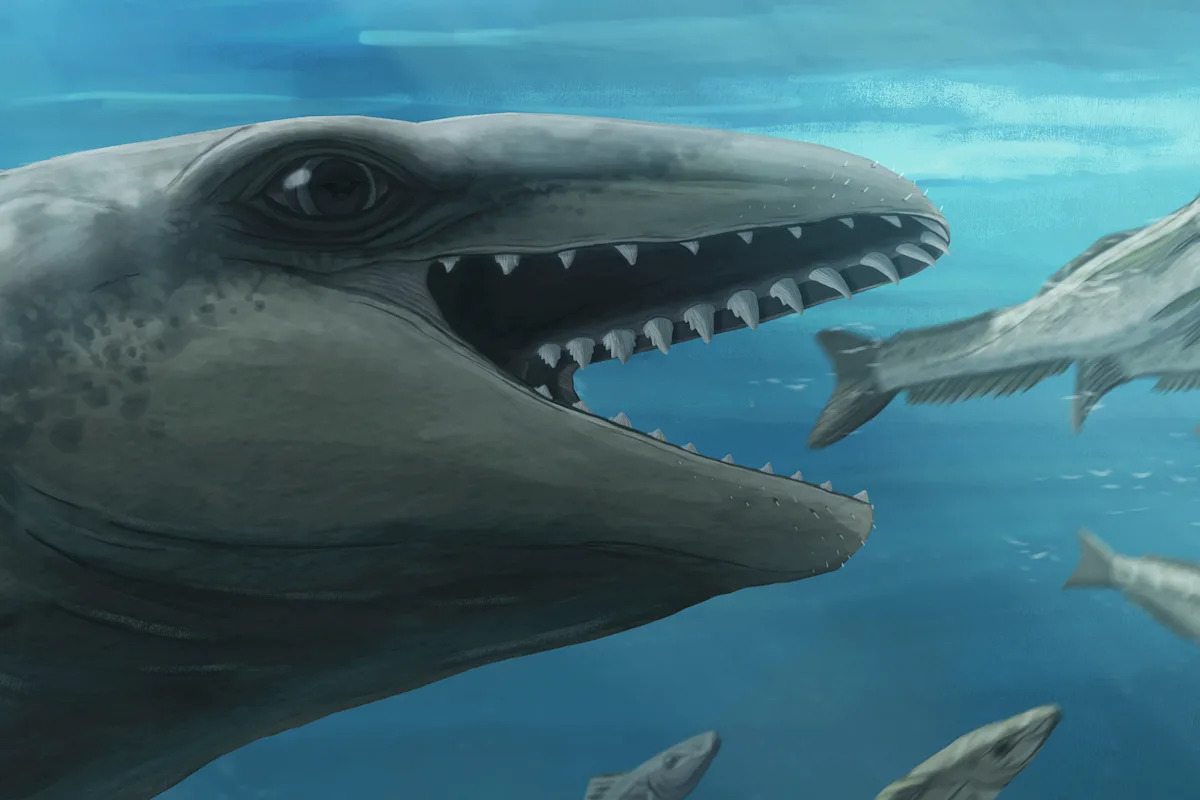Science
Researchers Discover New Prehistoric Whale Species in Australia

A team of paleontologists has identified a new species of prehistoric whale, named Janjucetus dullardi, based on a fossil discovered on an Australian beach. This remarkable find, dated at approximately 25 million years old, sheds light on the evolutionary history of modern whales. The announcement was made this week in the Zoological Journal of the Linnean Society.
The fossil, a partial skull featuring ear bones and teeth, was unearthed in 2019 at Jan Juc Beach in Victoria, Australia. This beach has become a significant site for understanding early whale evolution, according to Erich Fitzgerald, senior curator of vertebrate paleontology at Museums Victoria and one of the authors of the study. “Jan Juc Beach is a cradle for some of the weirdest whales in history,” Fitzgerald remarked.
The juvenile specimen, small enough to fit in a single bed, featured bulging eyes reminiscent of tennis balls and a shark-like snout. In contrast to today’s whales, this creature was a fierce predator with sharp teeth, suggesting it was built for hunting. Fitzgerald described it as “deceptively cute,” likening its appearance to a mix of a whale, a seal, and a Pokémon.
Insights into Whale Evolution
The identification of Janjucetus dullardi marks a significant milestone in paleontology, as it is only the fourth species recognized from a group known as mammalodontids. These early whales thrived during the Oligocene Epoch, approximately 34 to 23 million years ago. They represent a critical branch on the evolutionary tree leading to modern baleen whales, including humpbacks, blues, and minkes.
Fitzgerald highlighted the distinctive characteristics of these ancient predators, noting that “they may have had tiny little nubbins of legs just projecting as stumps from the wall of the body.” However, much about their anatomy remains speculative, as the discovery of a more complete skeleton is necessary for deeper insights into their form and function.
The fossil was discovered by Ross Dullard, an amateur fossil hunter, who described the experience as “the greatest 24 hours of my life” following the confirmation of the new species. Dullard stumbled upon the skull during a routine fossil-hunting trip at Jan Juc Beach. Recognizing its potential significance, he contacted Museums Victoria, leading to Fitzgerald’s immediate suspicion of a new species.
Rarity of Fossil Discoveries
The identification of Janjucetus dullardi is a rare occurrence, as significant finds of this nature are uncommon in Australia. This represents the first mammalodontid identified in the country since 2006 and only the third on record overall. Fitzgerald explained that cetaceans constitute a small fraction of all life, and many factors, including erosion and scavengers, contribute to the scarcity of well-preserved fossils.
“Only the chosen few, the vast minority of all whales that have ever lived, actually get preserved as fossils,” Fitzgerald noted. Discoveries like this one not only enhance our understanding of how ancient whales lived and evolved but also provide insights into how species adapted to changing environmental conditions.
As researchers continue to explore the implications of these findings, Dullard plans to celebrate the discovery with a fossil-themed event this weekend, featuring games and treats inspired by cetaceans. Reflecting on his six-year journey, he expressed relief at the validation of his find, stating, “That’s taken my concentration for six years. I’ve had sleepless nights. I’ve dreamt about this whale.”
-

 Technology5 months ago
Technology5 months agoDiscover the Top 10 Calorie Counting Apps of 2025
-

 Health2 months ago
Health2 months agoBella Hadid Shares Health Update After Treatment for Lyme Disease
-

 Health3 months ago
Health3 months agoErin Bates Shares Recovery Update Following Sepsis Complications
-

 Technology4 months ago
Technology4 months agoDiscover How to Reverse Image Search Using ChatGPT Effortlessly
-

 Technology1 month ago
Technology1 month agoDiscover 2025’s Top GPUs for Exceptional 4K Gaming Performance
-

 Technology2 months ago
Technology2 months agoElectric Moto Influencer Surronster Arrested in Tijuana
-

 Technology5 months ago
Technology5 months agoMeta Initiates $60B AI Data Center Expansion, Starting in Ohio
-

 Technology5 months ago
Technology5 months agoRecovering a Suspended TikTok Account: A Step-by-Step Guide
-

 Health4 months ago
Health4 months agoTested: Rab Firewall Mountain Jacket Survives Harsh Conditions
-

 Lifestyle5 months ago
Lifestyle5 months agoBelton Family Reunites After Daughter Survives Hill Country Floods
-

 Technology4 months ago
Technology4 months agoHarmonic Launches AI Chatbot App to Transform Mathematical Reasoning
-

 Technology3 months ago
Technology3 months agoUncovering the Top Five Most Challenging Motorcycles to Ride





















